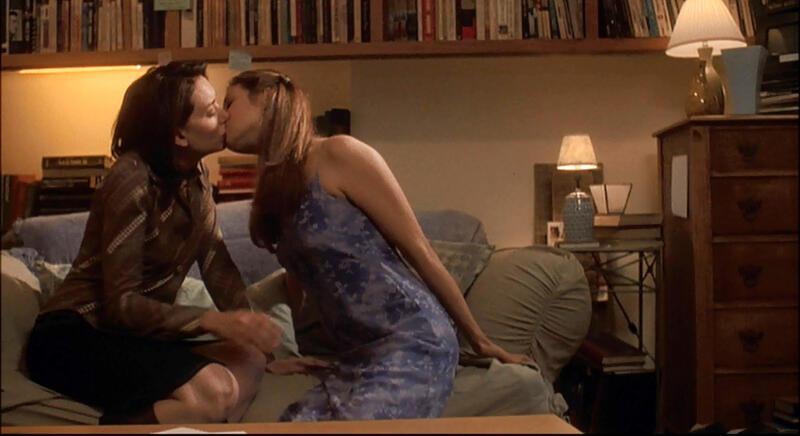The Expansive Queerness of "Kissing Jessica Stein"
In case you couldn’t tell from the swift change of corporate logos from their usual neutral tones to the ROYGBIV color spectrum…it’s Pride Month.
As June’s celebrations are tainted by "rainbow capitalism," the commodification of the rainbow flag by corporations to offer the illusion of diversity without the follow-through, queer folks are forced to reckon with “pride” and the ongoing struggle for LGBTQ+ rights that are constantly under threat.
When the palatable queerness of rainbow capitalism (read: white, cisgender, male, middle/upper class, able-bodied, Christian) becomes so commonplace, the question becomes: Where do identities on the margins of these narrow boxes fit in? Media representation plays a huge role. Visibility allows us to imagine new possibilities for ourselves.
But what happens when we don’t see ourselves reflected in the media we consume?
One option is what scholar José Esteban Muñoz calls disidentification. Rather than accept or reject normative culture, which often excludes minority racial and sexual identities, people with these identities choose to reinterpret the culture to create space for their identities. Examples of disidentification range from a tweet identifying Donkey and Dragon’s relationship in Shrek as queer to the TikTok trend where queer creators share images or pieces of media that give them “gender envy,” definitions of gender that lie outside the gender binary—for example, Marcel the Shell, Alice Cullen from Twilight, and illustrations of goblins or fairies from The Spiderwick Chronicles. These examples aren’t inherently queer, but become queer through the creator’s interpretation.
In other words, disidentification is everywhere. So, dear reader, in the spirit of a more queer Pride, I present to you an alternative read of the canonical queer Jewish film Kissing Jessica Stein.
Released in 2001, Kissing Jessica Stein follows the romantic trials of the film’s namesake—a Jewish, straight-laced, high-strung editor at the fictional New York Tribune. Through a tragically relatable dating montage of antisocial, hypersexual, and/or narcissistic men (including one man so arrogant he tells her he’s “normally a pretty self-defecating guy”), it's clear that Jessica is unable to find a partner who is her intellectual equal.
Intrigued by museum curator Helen Cooper’s “woman seeking woman” ad in the newspaper and its accompanying quote by poet Rainer Maria Rilke, Jessica takes a leap of faith and agrees to meet Helen for a drink. Jessica's anxious perfectionism contrasts with Helen’s cool adventurousness.
“Opposites attract,” they say, but they also create conflict. From Jessica avoiding intimacy to hiding the nature of her relationship with Helen from her family, Helen’s character functions to break down Jessica’s previously narrow vision for her life. Although (spoiler alert!) the film ends with Jessica still unable to meet Helen’s needs, she emerges with a newfound sense of confidence and ease.
Let’s be clear: There are certainly components of the film that highlight its dated discourse on bisexuality—frequently referring to Jessica and Helen as “lesbians” despite the fact that both women have had romantic relationships with men, the insistence that both women have to choose whether to be straight or gay, and, of course, the biggest doozy: that Jessica ends up with her toxic male ex at the end.
These are all valid critiques. Still, in 2022, there is something so clever and subversive about Kissing Jessica Stein. After its release in 2001, publications like Slate and the New York Post likened it to a low-budget Annie Hall or When Harry Met Sally. What these comparisons miss is how KJS skillfully deploys the tropes of the standard romcom and flips them upside-down.
Over and over again, KJS takes archetypes like the greasy, objectifying men at the bar or the insistent Jewish mother pressuring her daughter to “settle down,” and reexamines them in subversive ways that older romcoms would never dream to broach.
Roughly halfway through the film, Jessica and Helen sit at a bar, a few months into their relationship, and are approached by two slimy wannabe executives with an opening line that made me dry heave: “Me and my friends over at the bar have a little pool going. Basically we want to determine which one of you is more beautiful.” Jessica is quick to turn them away, but Helen asks, “Who won?” and invites them to join her and Jessica to settle an argument of their own:“whether a woman who’s only been with men could ever be sexually attracted to a woman.”
Practically having an out-of-body experience, one of them shouts, “Definitely. If she couldn’t, she should!” Helen prods further, asking what it is specifically that appeals to them about two women having sex. They moronically repeat several times that women are “soft,” suggesting they have never actually seen a woman naked. All the while Helen’s fingers drift up Jessica’s thigh under the table until Jessica squeals, cuing their exit with the excuse that Helen has to “get Jessica in bed” on account of a “leg cramp.” As the two women leave, one of the men turns toward the other and says, “You see, that's the thing about women. They really know how to take care of each other.”
As oblivious as the men are to their infantile pickup lines, they are just as oblivious to the game Helen plays with them. As the omniscient viewers, we are also pulled into Helen’s game, initially believing that she accepts the men’s degrading comments. And yet, as the scene progresses, we see how Helen takes the heteronormative narrative and turns it on its head. Just as we prepare for the impact of these objectifying comments, Helen reverses the power dynamic without those in power even knowing. It's liberating.
A later scene similarly inverts the viewer's expectations. Toward the end of the film, Jessica is consoled by her mother, Judy, after a fallout with Helen. Embarrassed by her relationship with Helen, Jessica had chosen not to invite her to her brother’s wedding. Unbeknownst to Jessica, Helen arrives at a bridal shop at Judy’s invitation. Jessica stands atop the podium for her fitting, wearing a hideous lilac bridesmaid’s dress, a confused Helen below her.
Later, at her brother’s rehearsal dinner Jessica excuses herself to the garden, where she is joined by her mother. In this low moment, Judy, played by Tovah Feldshuh, recalls Jessica’s participation in her elementary school play. Fearing her male co-star wasn’t good enough, Jessica quit the play, only to discover later that the boy was actually fantastic in the role. The story becomes an analogy for Jessica’s love life—her constant search for the unattainable “perfect relationship.”
Jessica has not come out to Judy, so the tension of this scene is palpable, especially to a queer viewer. We expect Judy to tell her daughter to settle for Josh, her manipulative ex. But just as we anticipate those words leaving her lips, she instead says, “I think she’s a very nice girl”—clearly referring to Helen. It's cathartic and leaves the viewer with whiplash. Judy is the stereotypical Jewish mother, judgmental and so concerned with the image of her family she places extreme pressure on her children to fulfill specific heteronormative (and dare I say assimilationist) roles. In a moment when queer viewers might anticipate Judy failing yet again to acknowledge, let alone accept, Jessica’s queerness, we get both. Here, KJS feels keenly aware of its impact on viewers, intentionally setting us up for loss and devastation only to surprise us with validation. It presents us with heteronormativity and then rejects it.
These scenes are crafted like funhouse mirrors. At first glance we see and expect the heteronormative trope, but the closer we get, the more trope is distorted, subverted and queered. KJS is in constant dialogue with itself and with the audience, navigating the confines of compulsive heterosexuality at a time well before the legalization of gay marriage and just at the onset of queer representation in film. And amidst all of this, we have the incorporation of Yiddish, a Shabbat dinner, and even an opening scene at Yom Kippur services. The result is a queer story that has Jewish content, but isn’t only about being Jewish.
Despite its uplifting moments, the film ends with disappointment: Helen breaks up with Jessica for not being as physically intimate with her as she would like and dates a new woman, and Jessica reconnects with her supposedly rehabilitated ex. But what if the ending of the film is also subversive? Throughout the film, we see KJS’s perpetual struggle with heteronormative ideology. We can feel queerness desperately fighting to keep its head above the surface. In the end, it loses. That could signify the inability of queer love to survive…or it could be yet another subversion of the fairy tale, happily-ever-after ending that is a staple of any romcom. In a world where bisexual representation in media— let alone Jewish bisexual representation— has been limited and largely whitewashed, we can choose to see Kissing Jessica Stein as a radical refusal of heteronormative tropes, and one that allows us to imagine a more satisfying—and more queer—fairy tale ending.







